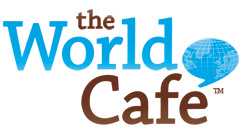These words from educator and World Café researcher Elaine Johnson:
I’m just beginning to work on a brain workshop I’m presenting to the Northwest Regional Conference of Mathematicians – and Juanita’s summary of Maturana’s comments touched a chord.
Maturana says that emotions and language, intertwined, shape our culture. Words especially, he points out, lead to actions. Words, then, have the power to shape our human community, our culture, our “manner of living.” In fact, so inextricably bound are language and community that scientists think
the longing for community, for intimate communication, gave rise to language.
Of course Maturana, a world authority on the brain, speaks to the heart of World Café. Café allows language to bring forth new actions and inspire new communities.
However, the brain presents obstacles to a Café’s success, and it is these that I wish to address. The human brain has evolved to reflect–it is the universe reflecting on itself. The problem is that the brain does not think very well. Reason is supplanted again and again by raw emotion, or by our emotional attachment to our beliefs. Each person’s brain holds beliefs, values, and attitudes that have been shaped by parents, friends, neighbors, teachers, and even television commercials. These beliefs and values are
actually contained in brain circuits. They’re part of the physiology of the brain. As such, they act as “frames” or “schema” that shape our response to everything. What we believe decides what we are able to see or hear or are willing to think.
Just as surely as an arm is part of us, and we will fight to protect and keep our arm, so a belief is part of us, and we will fight to keep it, even when it’s wrong. We humans are so emotionally attached to our beliefs–they are wired in our brains, remember– that we first embrace them and later search for reasons to justify them. We would rather be wrong than sacrifice a conviction.
Part of the problem, as neuroscientists explain, is that communication in the brain runs mainly from the emotional center to the thinking part of the brain, and not very much in the other direction. We feel more than we reason. We have great trouble diminishing our emotions.
One of the challenges of World Café, then, must be to see that people think well–that they are truly mindful of deep-seated biases and able, somehow, to say, “This is a prejudice, and for the sake of our dialogue, I am going to set it aside.”
I teach advanced argumentation at university, and I’ve written about the steps involved in reasoning well. However, brain research compellingly insists that we regard the call to reason as more than an interesting
academic subject.
Reasoning well is the only source of those words we need so badly–the powerful, true words that can guide constructive actions, actions that will allow individuals, communities, and Earth to flourish.
Helping people ask good questions, and expecting that from considering good questions insight will arise makes sense. But . . .it especially makes sense among people who in all humility recognize that they are wired with circuitry that makes them biased and narrow and who are eager to set aside their biases, at least for the sake of a rich conversation.
A hopeful discovery is that the very act of thinking can change the brain. That means that words–true and valuable words reflecting keen insights–will emerge if we use practice them. Practice and reason lead to words that can change society.



0 Comments